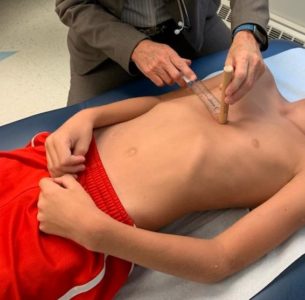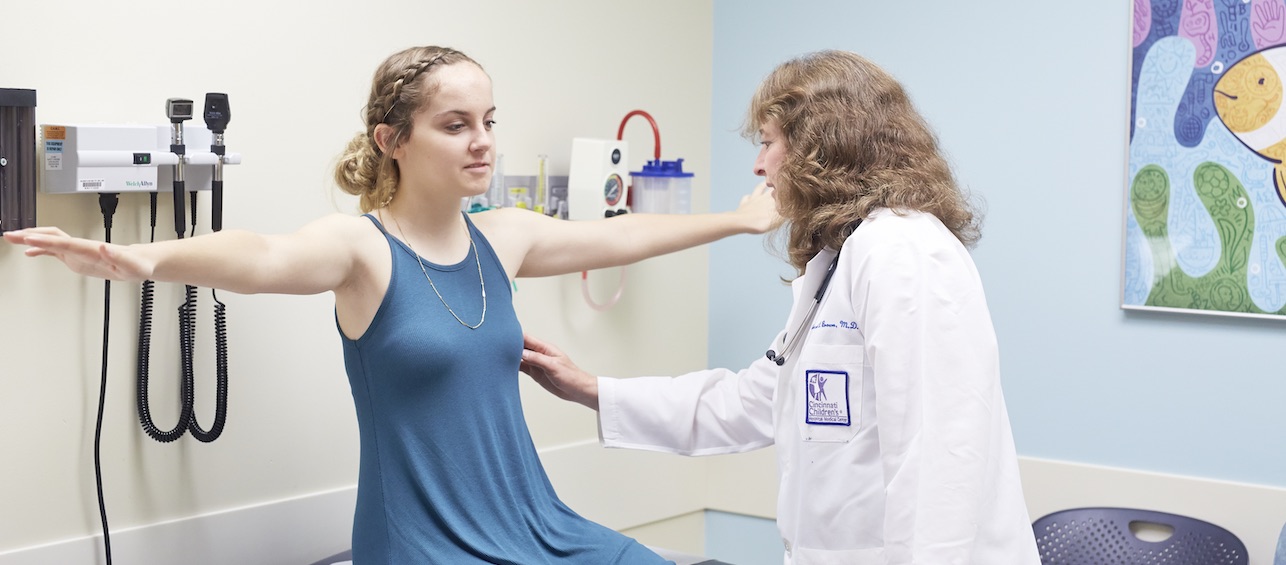Have you noticed an indentation or depression in your child’s chest and wondered, Is this normal?
Pectus excavatum is the name of the condition where a child’s sternum, or breastbone, pushes inward. It’s also sometimes called sunken chest or funnel chest. The condition is quite common, occurring in 1 in every 300-400 children. We see patients of all ages with the condition, from newborns through teenagers, and sometimes even adults.
Below are questions we help answer for families who are concerned about the appearance of their child’s chest.
Is Pectus Excavatum A Cause For Concern?
As with many childhood conditions, pectus excavatum has a range of severity. Some kids have a mild dip in the chest with no symptoms at all. In more severe cases, it can cause shortness of breath, trouble breathing with exertion, inability to tolerate exercise well, irregular heart beats, or chest pain.
The chest wall is very flexible in childhood. So from birth to about age 11-12, it’s rare for a child to have symptoms from pectus excavatum or for it to cause them harm.
But as a child grows, the sternum becomes less flexible and can continue to grow inward. When it does this, it can push on the heart and lungs. That’s when pectus excavatum may be a cause for concern.
While pectus excavatum is a life-altering condition, it is not life-threatening.
![]() Should My Child See A Doctor?
Should My Child See A Doctor?

We encourage any parent who is concerned about an abnormality in their child’s chest to make an appointment with our Chest Wall Center for an evaluation.
At the first appointment, we do a full evaluation and make recommendations based on your child’s age, symptoms (if any), and how severe the condition is.
In younger children, there is usually no need for action at the first appointment. We use that initial visit as a starting point and will see your child yearly after that. This allows us to watch your child’s chest wall from year to year, chart any progress, and determine what steps might be needed in the future.
That first appointment gives a lot of our families peace of mind when they hear they don’t need to follow special precautions or limit activities for their child.
What If The Indentation Gets Deeper?
This is quite likely to happen, as the natural progression with pectus excavatum is for the depression to deepen over time.
As your child grows, we will watch to see how their condition progresses. Children typically follow one of these three treatment paths:
1. No treatment.
Sometimes mild cases correct themselves early in childhood.
2. Non-surgical treatment.
For milder cases, we have recently begun offering vacuum bell therapy as a way to treat pectus excavatum without surgery. The vacuum bell is a newer technology that uses a device like a suction cup to lift the sunken chest. The device is worn for a certain length of time each day over a period of 1-2 years. Results have been very positive with this treatment in younger children ages 6-12 years with a mild pectus defect. It may eliminate the need for surgery in up to 35% of patients who have used this therapy.
3. Surgery.
Children with moderate to severe cases may require surgery. The most common surgery to correct pectus excavatum is a minimally invasive procedure called a Nuss procedure.
How Do You Decide If Surgery Is Needed?
We consider many factors when determining if surgery is the right treatment for your child’s pectus excavatum. We do a complete workup that includes a cardiac MRI to give us a 3D view of the chest. Your child will go through a cardiopulmonary exercise test to see if the condition is limiting the ability to exercise. And we look to see if your child’s heart and/or lung function are restricted in any way.
Once we evaluate all of those results together, we will provide you with treatment recommendations that we feel will be best for your child’s long-term health.
My Child’s Chest Pushes Outward, Not Inward. Is That A Problem Too?
This condition, where the chest wall pushes out, is called pectus carinatum. In the United States, pectus carinatum is less common than pectus excavatum. (Interestingly, the opposite is true in South America.)
For parents who notice this abnormality in their child, I’d also recommend a visit to our Chest Wall Center. We follow the same steps in caring for children with this condition, where we monitor growth from year to year.
Treatment for pectus carinatum typically involves using a brace that provides continual pressure on chest to allow it to reform. We use a brace called an FMF Dynamic Compressor that has a very high success rate. We’ve used this brace on more than 300 patients with great results.
It is rare that we need to perform surgery on kids with pectus carinatum because bracing is such an effective treatment for this condition.
Both pectus excavatum and pectus carinatum can cause self-esteem issues in kids, especially as they get into their teen years. We have more than 1,000 patient visits each year related to these conditions, and we are passionate about finding the right approach to treat them. If you have concerns about your child’s chest, please give us a call.


My child is 2.7, I noticed a bone in her chest but no pain, is it normal?